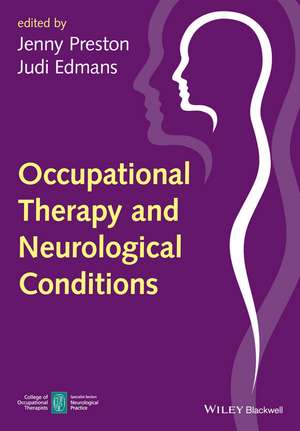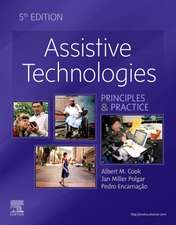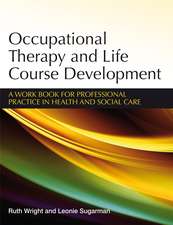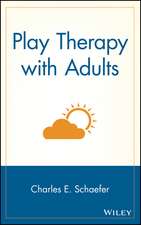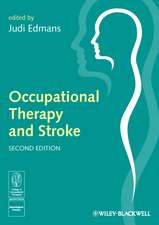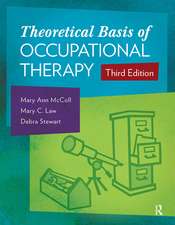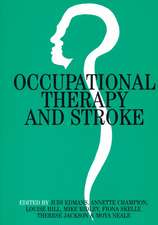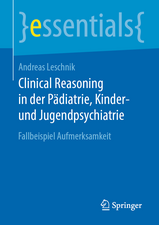Occupational Therapy and Neurological Conditions
Autor J Edmansen Limba Engleză Paperback – 5 mai 2016
- Covers the key symptoms of neurological conditions and the biological basis of these within the ICF framework
- Provides an overview of therapy and management for all neurological conditions
- Includes key occupational therapy theory
- Case studies root concepts in real–life practice
- End–of–chapter self–evaluation questions help test understanding
Preț: 332.69 lei
Preț vechi: 350.21 lei
-5% Nou
63.66€ • 65.78$ • 52.96£
Carte disponibilă
Livrare economică 26 februarie-12 martie
Livrare express 12-18 februarie pentru 33.92 lei
Specificații
ISBN-10: 1118936116
Pagini: 232
Dimensiuni: 170 x 244 x 11 mm
Greutate: 0.45 kg
Editura: Wiley
Locul publicării:Chichester, United Kingdom
Public țintă
Primary market: Occupational Therapy students, newly–qualified Occupational Therapists, and those new to neurologySecondary Market: Occupational Therapy assistants, and other allied health students
Cuprins
List of figures and tables, viii List of contributors, x
Academic foreword, xi
Service user foreword, xii
Preface, xiii
Acknowledgements, xiv
1 Introduction, 1
1.1 Economic impact of long ]term neurological conditions, 1
1.2 Definition of long ]term neurological conditions, 2
1.3 International Classification of Functioning, Disability and Health, 2
1.4 Huntington s disease, 4
1.5 Motor neurone disease, 9
1.6 Multiple sclerosis, 13
1.7 Parkinson s, 18
1.8 Self ]evaluation questions, 22
References, 22
2 Delivering good quality, safe and effective care, 24
2.1 Introduction, 24
2.2 The strategic context, 24
2.3 Evidence ]based practice, 27
2.4 Clinical guidelines, 33
2.5 Practice guidance, 33
2.6 Client expertise in evidence ]based practice, 35
2.7 Quality improvement, 36
2.8 Health economic evaluation, 39
2.9 Professional standards of practice, 40
2.10 CPD and lifelong learning, 40
2.11 Self ]evaluation questions, 42
References, 43
3 Person ]centredness and long ]term neurological conditions, 46
3.1 Introduction, 46
3.2 Person ]centredness, 46
3.3 Client ]centred practice, 48
3.4 Self ]management, 55
3.5 Co–production, 57
3.6 Evaluating your practice, 58
3.7 Self–evaluation questions, 59
References, 60
4 Theoretical basis, 63
4.1 Introduction, 63
4.2 Definitions of occupational therapy, 63
4.3 Central philosophy of occupational therapy, 65
4.4 Core professional reasoning skills, 65
4.5 Conceptual models of occupational therapy practice, 69
4.6 Frames of reference, 78
4.7 Context ]dependent practice skills, 81
4.8 Self ]evaluation questions, 83
References, 83
5 Occupation and long ]term neurological conditions, 86
5.1 Introduction, 86
5.2 Defining occupation, 86
5.3 Occupational patterns, 87
5.4 Doing, being, becoming and belonging, 88
5.5 Occupational dysfunction, 93
5.6 Occupational adaptation, 96
5.7 Defining occupational goals, 98
5.8 Self ]evaluation questions, 99
References, 99
6 Identifying occupational performance enablers and deficits, 101
6.1 Introduction, 101
6.2 What is measurement?, 101
6.3 What are occupational therapy outcomes?, 102
6.4 Selecting the right measure, 103
6.5 Commonly used measures in neurological rehabilitation, 106
6.6 Disease ]specific measures, 111
6.7 Self ]evaluation questions, 118
References, 118
7 Occupational therapy intervention, 122
7.1 Introduction, 122
7.2 Activities of daily living, 123
7.3 Fatigue management, 124
7.4 Cognitive rehabilitation, 126
7.5 Anxiety management, 129
7.6 Falls management, 135
7.7 Pain management, 137
7.8 Managing tremor, 140
7.9 Sleep, 143
7.10 Sexual relationships and intimacy, 144
7.11 Self evaluation questions, 147
References, 147
8 Using technology to support participation, 150
8.1 Introduction, 150
8.2 Environmental characteristics and occupational performance, 150
8.3 Environmental adaptations, 151
8.4 Assistive technology, 152
8.5 Assistive devices, 152
8.6 Housing adaptations, 154
8.7 Seating and postural management, 156
8.8 Management of posture and positioning in sitting, 158
8.9 Management of posture and positioning in lying, 160
8.10 Splinting, 162
8.11 Electronic assistive technology, 163
8.12 Self ]evaluation questions, 168
References, 168
9 Living with a long ]term neurological condition, 171
9.1 Introduction, 171
9.2 Transitions theory, 171
9.3 Illness experiences, 172
9.4 Rehabilitation and recovery, 173
9.5 Lifespan transitions, 174
9.6 Social and cultural transitions, 175
9.7 Caregiving, 183
9.8 Psychosocial adjustment, 185
9.9 Self ]evaluation questions, 189
References, 189
10 Planning for the future, 194
10.1 Introduction, 194
10.2 Disease progression, 194
10.3 The nature of occupation in death and dying, 197
10.4 Facilitation of meaning, quality of life and well ]being, 198
10.5 Spirituality, 198
10.6 Therapeutic use of self, 199
10.7 Advance care planning, 200
10.8 Conclusion, 209
10.9 Self ]evaluation questions, 209
References, 210
Index, 212
Descriere
While diagnosis with a neurological condition may not be life–threatening, it can have significant impact on everyday life and on participation in activities. Occupational therapists must be able to fully consider the physical, cognitive, emotional, psychological and behavioural problems which may occur as a consequence of a neurological disorder, and understand the impact of diagnosis from a person–centred perspective. Occupational Therapy and Neurological Conditions incorporates theoretical, clinical and research evidence to support occupational therapists in the management of people with neurological conditions.
- Covers the key symptoms of neurological conditions and the biological basis of these within the ICF framework
- Provides an overview of therapy and management for all neurological conditions
- Includes key occupational therapy theory
- Case studies root concepts in real–life practice
- End–of–chapter self–evaluation questions help test understanding
Occupational Therapy and Neurological Conditions is the ideal resource to support students, newly–qualified practitioners, and occupational therapists looking for an overview or introduction to this key area of practice.
Notă biografică
Judi Edmans, PhD, MPhil, DipCOT, FCOT is a Senior Research Fellow in the Division of Rehabilitation and Ageing at the University of Nottingham. She has been qualified for over 35 years, has worked mainly in stroke both in clinical practice and research and is the editor of the book Occupational Therapy and Stroke.
